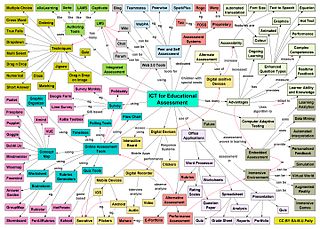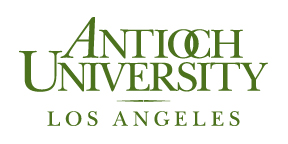
Herbert Marshall McLuhan was a Canadian philosopher whose work is among the cornerstones of the study of media theory. He studied at the University of Manitoba and the University of Cambridge. He began his teaching career as a professor of English at several universities in the United States and Canada before moving to the University of Toronto in 1946, where he remained for the rest of his life. He is known as the "father of media studies".

Antioch University is a private university with multiple campuses in the United States and online programs. It is the offshoot of Antioch College, which was founded in 1852. Antioch College's first president was politician, abolitionist, and education reformer Horace Mann. In 1977, the College network was re-incorporated as Antioch University to reflect its growth across the country into numerous graduate education programs. It operates four campuses located in three states, as well as an online division and the Graduate School of Leadership and Change. All campuses of the university are regionally accredited by the Higher Learning Commission.

Harold Adams Innis was a Canadian professor of political economy at the University of Toronto and the author of seminal works on media, communication theory, and Canadian economic history. He helped develop the staples thesis, which holds that Canada's culture, political history, and economy have been decisively influenced by the exploitation and export of a series of "staples" such as fur, fish, lumber, wheat, mined metals, and coal. The staple thesis dominated economic history in Canada from the 1930s to 1960s, and continues to be a fundamental part of the Canadian political economic tradition.
Media ecology theory is the study of media, technology, and communication and how they affect human environments. The theoretical concepts were proposed by Marshall McLuhan in 1964, while the term media ecology was first formally introduced by Neil Postman in 1968.

Understanding Media: The Extensions of Man is a 1964 book by Marshall McLuhan, in which the author proposes that the media, not the content that they carry, should be the focus of study. He suggests that the medium affects the society in which it plays a role mainly by the characteristics of the medium rather than the content. The book is considered a pioneering study in media theory.

Information and communications technology (ICT) is an extensional term for information technology (IT) that stresses the role of unified communications and the integration of telecommunications and computers, as well as necessary enterprise software, middleware, storage and audiovisual, that enable users to access, store, transmit, understand and manipulate information.

A telecentre is a public place where people can access computers, the Internet, and other digital technologies that enable them to gather information, create, learn, and communicate with others while they develop essential digital skills. Telecentres exist in almost every country, although they sometimes go by a different names including public internet access center (PIAP), village knowledge center, infocenter, Telecottage, Electronic Village Hall, community technology center (CTC), community multimedia center (CMC), multipurpose community telecentre (MCT), Common/Citizen Service Centre (CSC) and school-based telecentre. While each telecentre is different, their common focus is on the use of digital technologies to support community, economic, educational, and social development—reducing isolation, bridging the digital divide, promoting health issues, creating economic opportunities, and reaching out to youth for example.

One Laptop per Child (OLPC) was a non-profit initiative established with the goal of transforming education for children around the world; this goal was to be achieved by creating and distributing educational devices for the developing world, and by creating software and content for those devices.
Media transparency, also referred to as transparent media or media opacity, is a concept that explores how and why information subsidies are being produced, distributed and handled by media professionals, including journalists, editors, public relations practitioners, government officials, public affairs specialists, and spokespeople. In short, media transparency reflects the relationship between civilization and journalists, news sources and government. According to a textual analysis of “Information Subsidies and Agenda Building: A Study of Local Radio News”, an information subsidy is defined as “any item provided to the media in order to gain time or space”. In order to understand media transparency, one must gain an understanding of the different aspects in which media transparency is researched, understood, and explored. The following page will attempt to examine media transparency as it has grown and how it affects the modern world.
Robert K. Logan, originally trained as a physicist, is a media ecologist.
The VIA pc-1 Initiative is a project of VIA Technologies, established in January 2005, to help bridge the digital divide by developing information and communication technology (ICT) systems to benefit those who currently do not have computers or Internet access.
Medium theory is a mode of analysis that examines the ways in which particular communication media and modalities impact the specific content (messages) they are meant to convey. It Medium theory refers to a set of approaches that can be used to convey the difference in meanings of messages depending on the channel through which they are transmitted. Medium theorists argue that media are not simply channels for transmitting information between environments, but are themselves distinct social-psychological settings or environments that encourage certain types of interaction and discourage others.
Global village describes the phenomenon of the entire world becoming more interconnected as the result of the propagation of media technologies throughout the world. The term was coined by Canadian media theorist Marshall McLuhan in his books The Gutenberg Galaxy: The Making of Typographic Man (1962) and Understanding Media (1964). Literary scholar Sue-Im Lee describes how the term global village has come to designate “the dominant term for expressing a global coexistence altered by transnational commerce, migration, and culture”. Economic journalist Thomas Friedman's definition of the global village as a world “tied together into a single globalized marketplace and village” is another contemporary understanding of the term.
John M. Culkin, Jr. was an American academic and former priest who was a leading media scholar and critic, educator, writer and consultant.
The Toronto School is a school of thought in communication theory and literary criticism, the principles of which were developed chiefly by scholars at the University of Toronto. It is characterized by exploration of Ancient Greek literature and the theoretical view that communication systems create psychological and social states. The school originated from the works of Eric A. Havelock and Harold Innis in the 1930s, and grew to prominence with the contributions of Edmund Snow Carpenter, Northrop Frye and Marshall McLuhan.

Antioch University Los Angeles (AULA) is a campus of Antioch University in Culver City, California.

Marshall McLuhan Catholic Secondary School is a coeducational, non-semestered, Catholic high school in midtown Toronto, Ontario, Canada managed by the Toronto Catholic District School Board. The school was formally founded in September 1998 to replace De La Salle College Oaklands campus, founded by the De La Salle Brothers in 1851, which was reverted as a private school in 1994. The school property was originally built for the Toronto Hunt Club and later used by the Canadian Armed Forces as the Canadian Forces Staff School until 1994.
Professor Shazia Sadiq is a computer scientist based in Queensland, Australia.
Educational technology in sub-Saharan Africa refers to the promotion, development and use of information and communication technologies (ICT), m-learning, media, and other technological tools to improve aspects of education in sub-Saharan Africa. Since the 1960s, various information and communication technologies have aroused strong interest in sub-Saharan Africa as a way of increasing access to education, and enhancing its quality and fairness.

The digital divide in Thailand refers to the economic, educational, and social inequalities between the Thai people who have access to information and communications technology (ICT) and those who do not. Thailand is a developing country within Southeast Asia, and is currently confronted with this problem. There are a number of factors that determine the digital divide within a country, including income, choice of technologies and socioeconomic factors. ICT development and mobile penetration are strongly correlated with economic growth and social benefits.










